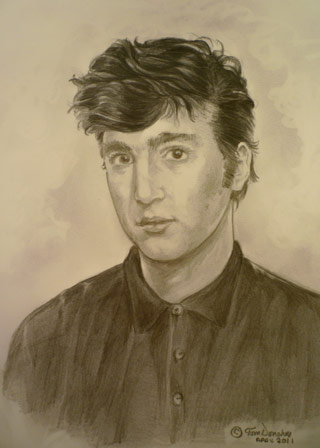
| HOME |
| NERVE |
| REVIEWS |
| ARCHIVE |
| EVENTS |
| LINKS |
| ABOUT US |
| CONTRIBUTORS |
| BACK ISSUES |
| CONTACT US |
Back to index of Nerve 18 - Summer 2011
 Lennon
the ‘Outsider’
Lennon
the ‘Outsider’
By Francis Kenny
'Hamburg Days' by Tom Donohue
Many parts of The Beatles history is full of conventional wisdom, airbrushed and decorated with honest accounts of people who knew them. But many of the views have been distorted or made flexible to the listener, or reader. None of these aspects of the invented “The Beatles Story” is more obvious than that in Lennon’s place of birth - Liverpool. Outside the “Birthplace of The Beatles” the Cavern Club, where the group played nearly 300 times, is a life size bronze statue of John Lennon. It is resplendent in its heavy leather boots, standing one hooked behind the other, leather trousers, leather jacket and...Beatle haircut, except that the Beatle haircut is normally associated with the Pierre Cardin “bum freezer”, “Beatle suits” and tens of thousands of screaming fans, not leather, definitely not leather.
But when this statue was first revealed in Mathew Street, it had a DA Teddy Boy slicked back hairstyle - just like The Beatles had when they played Hamburg, just like they had when they wore leather suits. The public, though, upon viewing this accurate depiction of Lennon at a particular time in his development, decided that this wasn’t what they wanted and consequently a rewriting of history took place. Despite the statue being modelled on a photograph taken in Hamburg which was later to become the cover for his 1974 Rock ‘n Roll album, the “greaser look” was replaced by the more acceptable “mop top” look. What follows is a challenge of the orthodox versions that have attempted to understand the confusion and pain that lay behind one of popular music’s most researched yet misunderstood genius. And it all starts in Liverpool.
During his time with The Beatles, John Lennon is often seen as by far the most radical and controversial member of the band, his confrontational and at times disparaging and cruel attitude is often cited as being due to his troubled childhood; he was torn apart from his mother, after his parents parted, and later as a teenager had to deal with his mother being run down by a speeding off-duty policeman. But his, at times, rebellious and aggressive attitude was influenced and formed by far more important and far-reaching factors than this.
Much of Lennon’s self-destructive attitude can be traced to the pressures and dilemmas he faced as a child, and as a young man, living under the suffocating influence of his aunt. To succeed in forming and leading the world’s greatest musical phenomenon Lennon had to become a sheep in wolf’s clothing.
Liverpool’s influence on John Lennon was both profound and ambivalent. His relatively well-off background left him adrift when it came to learning how to adopt a smart arse Scouse/Liverpool attitude which was essential for acceptance in the local Rock ‘n Roll scene.
Social historian Tony Lane believes that, “One of the most striking
characteristics of Liverpool people is their democratic inclination...
The inclination shows in the way Liverpudlians will talk confidently and
unselfconsciously on equal terms with others regardless of their status,
in their cheerful readiness to mock and puncture pretension.”
At the signing of their contract with Brian Epstein, Paul McCartney was
missing due to having a bath at home; when informed of this Epstein declared,
“He’ll be late!” “Yes,” George Harrison
replied, “but clean.”
Reporter to John Lennon: “The French haven’t made up their minds about The Beatles. What do you think of them?” John, “Oh, we like The Beatles.”
On promoting “A Hard Day’s Night”: Ringo - “John can act the goat”, John “If I wasn’t in America I’d punch him”, Ringo “You’re not big enough and when you are, you’ll be too old!”
Mimi had strong views regarding the rules and values relating to everyday living. These values and norms, though, were fuelled by a strong dislike of anything that deviated from what she saw as the natural order of things. According to Cynthia Lennon, “She was strict and insisted on rigid rules and absolute order.” And that one of Mimi’s favourite words was “Common”.
Liverpool at this time was a blue-collar city, with higher than normal unskilled manual workforce, deep poverty and the influence of being a major international port and in its heyday seen as the “Second City of Empire.” In 1964 the left-wing paper the Daily Worker declared that - “The Merseysound is the voice of 80,000 crumbling houses and 30,000 people on the dole (welfare).”
Coupled to this was the “outsiders” religion brought in by the Irish immigrant. In the 1890s Liverpool was the largest Roman Catholic diocese in England with over 400,000 people, one-fifth of the country’s total Catholic population and at the height of The Beatles fame in 1965, 30 per cent of families in Liverpool were Roman Catholic.
This sense of outsider was tied to a defensive elitism shown by the Scouser/Liverpudlian of quick wit, and solidarity. The gift of The Beatles at their early press interviews to deliver wickedly sharp and deadpan humour has its roots in the dockwork culture of the city.
The confident gabby Scouser came in part due to the constant mixing and forming of gangs on the docks and with having to work and socialise when away at sea with members of the crew, not just from other parts of the country but other countries. The extremely dense poor quality housing around the dockland zone and “cheek and jowl” living, meant the growth of fierce independence and an element of humour and wit were seen as a defence against poverty and adversity.